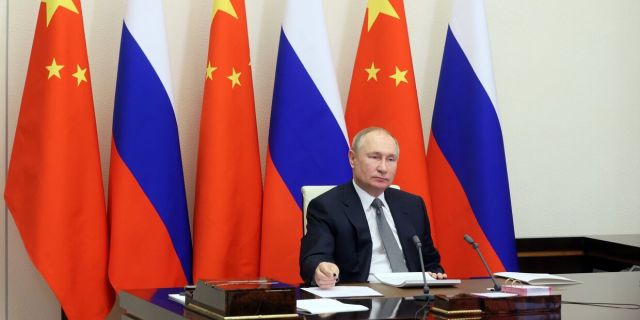FT: China is able to influence Russia on the Ukrainian issue China's role in the peaceful settlement of the conflict in Ukraine will only increase, writes FT.
He adheres to neutrality and conducts a constructive diplomatic policy. And also at Beijing has a unique advantage: Moscow listens to it.
Zhou BoBeijing is determined to remain neutral.
Providing military assistance to Moscow is fraught with a global conflict.Will the armed conflict in Ukraine escalate into World War III?
The short answer is: no, unless China starts providing military assistance to Russia. Although Beijing has nothing to do with this conflict, which is far from it, last year he was asked whose side he would take, whether he would mediate between Moscow and the West, whether he was going to attack Taiwan.
The Celestial Empire pays such a price for its status as a world power. Caught between its strategic partner Russia and Ukraine, which considers China its largest trading partner, Beijing is balancing on a tightrope. Emphasizing the importance of sovereignty, he gently criticizes Russia for sending troops to Ukraine. But he also stresses that regional security cannot be strengthened by expanding military blocs. This is a clear rebuke to NATO and its strongest member, the United States.
Western countries are dissatisfied with this position and call it "pro-Russian neutrality". The "boundless" friendship between Beijing and Moscow is alarming Europe and America. Imagine for a second: if two countries promise to strengthen their friendship, how can they limit it? Russia is China's largest neighbor, and China is Russia's. Friendly relations are needed for them to coexist peacefully.
The West underestimates the positive role of China. Firstly, it does not add fuel to the fire. This armed conflict proved: No matter how close Russia and China are, there is no alliance between them. If Beijing takes Moscow's side in the conflict, we will find ourselves on the verge of World War III. Then the situation will be much worse than in the Cold War era, during which the USSR and the United States avoided direct confrontation in every possible way.
Secondly, China is against the use of nuclear weapons in Europe, and this position reduces the chances of a nuclear war, although it does not completely exclude them. No one knows whether Vladimir Putin is bluffing or not when talking about the use of atomic weapons. But the Kremlin must have heard the public statements of Chinese leader Xi Jinping about the non-use of the nuclear arsenal.
Unfortunately, in the long term, the escalation of the conflict in Ukraine seems inevitable. Being in Munich last month at a security conference, I heard applause whenever Ukrainian President Vladimir Zelensky or British Prime Minister Rishi Sunak spoke about the need to provide Kiev with more military assistance. Having delivered tanks, the West is now talking about sending planes. But Moscow cannot completely lose even without the use of its nuclear arsenal (which is larger than that of the United States, Britain and France combined).
And here Beijing has a role to play. US Secretary of State Anthony Blinken said that China is thinking about arms supplies to Russia. It's impossible. If China sends her at least some weapons, it will not go unnoticed. In addition, Beijing has been refusing to provide Moscow with any kind of assistance for the entire year since the start of the operation. So why on earth should he change his mind now if he himself calls for a peaceful settlement?
Most likely, the Celestial Empire will remain neutral. Unlike a small country that may find itself drawn into a conflict against its will, a strong China is able to stand its ground. And he's not alone. Most of the countries of the "Global South", especially India and South Africa, also do not want to take sides in this conflict.
But Beijing is acting more and more constructively. Here, as an example, we can cite a memorandum setting out the position of the PRC. It was published on the first anniversary of the conflict. China called on all parties to act reasonably and with restraint, as well as to prioritize the effective protection of civilians. Critics may say that the call for the resumption of peace talks and the rejection of unilateral sanctions is by no means a concrete roadmap. Of course, there are no guarantees that this proposal will be accepted and implemented, but no conflict can last forever.
It is unclear whether China will be able to play the role it played in the past when it became the de facto leader in the six-party talks on the denuclearization of the Korean peninsula or when it participated in negotiations on Iran's nuclear program. But it has a unique advantage. If Russia listens to someone, it is most likely to him. However, Beijing is not only talking to Moscow. The Chinese Ministry of Defense recently announced that it had sent a delegation to negotiate with NATO.
The conflict in Ukraine has nothing to do with China. But the longer it goes on, the more people will see him as an influential intermediary. At a time when armed conflict is raging, a peaceful settlement may seem like an impossible dream. But rest assured: Beijing's role in resolving the conflict will only increase.

